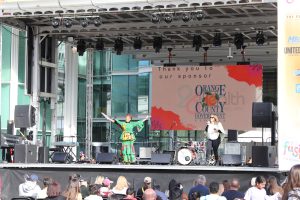Last week, the Latin American and Caribbean Studies (LACS) program held a weeklong event celebrating Latin America, known as “Semana LACS.”
During the week, there were many events highlighting different aspects of the region and its individual cultures. Although many of the events were quite lighthearted, Wednesday’s forum, entitled “The Rising Tide of Violence in Mexico: What Does it Mean for Us,” took a more serious tone, focusing on one of the biggest nations of the region and one of our closest geographical neighbors.
The forum was centered on the presentations of a three member panel: Eric L. Olson (senior associate, Security Program, The Mexico Institute at the Woodrow Wilson International Center for Scholars), Howard Campbell (professor of anthropology), and Ambassador Myles Frechette (senior associate, Center for Strategic and International Studies).
Each member discussed different aspects of the violence in Mexico and the successes and failures of the nation in trying to quell the problem. Each brought poignant insight about the situation, from the glamorization of the crime and drug dealing culture through music and other media, to its problems with crime and police force in relation to the authority of the Mexican government, to a comparison between the situation in Mexico and a previous dilemma in Columbia and how both situations are somewhat similar, yet still very different.
One of the most interesting points raised by the presenters was just how connected Mexico’s problems are with the United States and how much of an impact both countries have on each other.
Many problems within Mexico, whether weapons based or pertaining to drug production, are either directly or indirectly related to the United States’ high demand for said narcotics. By the end of the two hour forum, it was clear that the problem in Mexico is not going to go away any time soon, and it will be up to both the Mexican and American governments to work together to solve this issue.
When asked about the process of getting such prestigious speakers to come to Rollins for this special week (which has been in the works since August) Director of the LACS program, Associate Professor Dexter Boniface, says that special recognition needs to go to Professor Bob Moore (Department of Anthropology/Director of International Affairs at the Hamilton Holt School) and Adjunct Professor John Bersia (2000 Pulitzer Prize winner and director of the Global Perspectives Office at the University of Central Florida), for it could not have been possible without their help and the Thomas P. Johnson Distinguished Visiting Scholars Program. Though it was a difficult process finding these men and choosing a time that was accessible for each one’s schedule, the event as a whole turned out to be a success. The point of the event and the entire week was not only to help promote the LACS program (which, until the new Asian Studies program was designed, was the only Interdisciplinary Major/Minor program of its kind), but also to promote other campus opportunities, such as the study abroad program and the Latin American Student Association, to students who are similarly interested in getting involved with such an influential region.







Be First to Comment